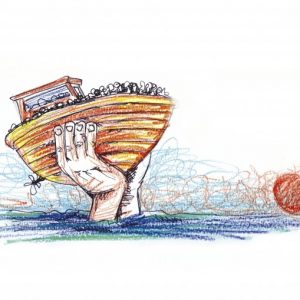
Story:
At the height of the Mediterranean refugee crisis in late 2015, an ecumenical group of Italian Christians banded together to establish Humanitarian Corridors. Since that time, over 1500 refugees have been given safe and legal access to new lives in a new country. Priority is given to victims of persecution, torture, and violence, families with children, and people with illnesses or other disabilities. Similar efforts have also begun in France and Belgium, and at this writing (June 2019) there is reason to hope that another 50,000 people may be allowed into European host countries through similar “corridors.”
The drawing above has become the symbol of Humanitarian Corridors. The artist (or as he prefers to be called, “social cartoonist,”) is Francesco Piobbichi. Working on the front lines of the crisis, Piobbichi asks what, to him, is the obvious question: “How could we be indifferent to this pain? In front of all those coffins, we said we wanted to change things. That’s why we had to create “humanitarian corridors” (Drawings from the Border, p. 56).
Bible Reading: Job 29:16-17 (NRSV)
Pelted with a litany false accusations by his so-called friends, Job responds with a list of his own. In that list, he names acts of kindness and justice that reflect the kind of person he truly is. “If I am guilty of anything,” he essentially says, “find me guilty of these things.”
Part of his manifesto includes the words:
I was a father to the needy, and I championed the cause of the stranger.
I broke the fangs of the unrighteous, and made them drop their prey from their teeth.
For refugees awaiting safe passage from torture, war, and despair, such words must seem as distant as the far side of the Mediterranean. Yet, they reflect the compassion and courage that created Humanitarian Corridors. They reflect the heart of all those who ask, “How can we be indifferent to their pain?”
Discussion/Reflection:
- A verse from the Talmud says, “Whoever saves one life saves the world entire.” How does this quote relate to the refugee situation? …to indifference?
- The Italian Christians who banded together to create Humanitarian Corridors were from the Community of Sant Egidio (a lay Catholic association), the Federation of Protestant Churches in Italy (FCEI), and the Waldensian and Methodist Church in Italy. Why is it so significant that this was an ecumenical effort? What might happen where you live if Christians worked together?
Action:
- Learn more about how the rise of hard-right populism relates to the immigration crisis by listening to this podcast from the New York Times’ “The Daily”: Italy First. Don’t miss the story about the teenage girl’s reaction to the news of an immigrant raft going down in the Mediterranean. It comes about 25 minutes into the 32 minute podcast.
- Read more about the work of Humanitarian Corridors at the web site of Mediterranean Hope

Prayer: Save me from the soothing sin of the empty cultic deed
and the pious, babbling din of the claimed but unlived creed.
Let my actions, Lord, express what my tongue and lips profess.
From the hymn, “As a Chalice,” by Thomas Troeger, 1984
Welcoming the Stranger Series
In the last ten years more than 35,000 asylum seekers have died in the Mediterranean. Desperate to escape untenable situations in countries like, Syria, Eritrea, Sudan, and Somalia, refugees risk both life and livelihood to board rickety boats bound for what they hope will be a new life in Europe. Many of them die within sight of what they hoped would be the promised land.
Welcoming the Stranger is a devotional series designed to help Christians connect this unfolding humanitarian crisis in the Mediterranean with the Bible’s call to “welcome the stranger.” Recognizing that “the stranger” can sometimes be an abstraction that blinds us to the face of Christ, the series approaches the refugee crisis from a personal perspective. Each entry focuses on one person’s story, brought vividly to life by Italian artist and relief worker, Francesco Piobbichi. These stories are then linked to relevant Scripture, prayer, discussion, and action prompts.
Immigration is a hot topic around the globe, and the Bible passages in this series speak to wherever we are called to “welcome the stranger.” My specific interest in the Mediterranean context was sparked by a 2016 trip to the island of Lampedusa—a small island off the coast of Sicily that is the scene of so much hope and tragedy for refugees trying to enter Europe via small, unsafe boats. In addition learning about the situation there and the work being done by ecumenical groups like Mediterranean Hope, I spent significant time interviewing Francesco Piobbichi, whose art documents the stories of individual refugees and families who often die trying to reach safety. You can learn more about him and work through the following link: Francesco Piobbichi’s Artwork Each of his “snapshots” tells a story—sometimes of triumph, but often of tragedy: Piobbichi’s goal is to help people understand this large-scale human tragedy on a more personal level. My goal in this series is to use Piobbichi’s art as a starting point for Bible study and personal reflection/action.
